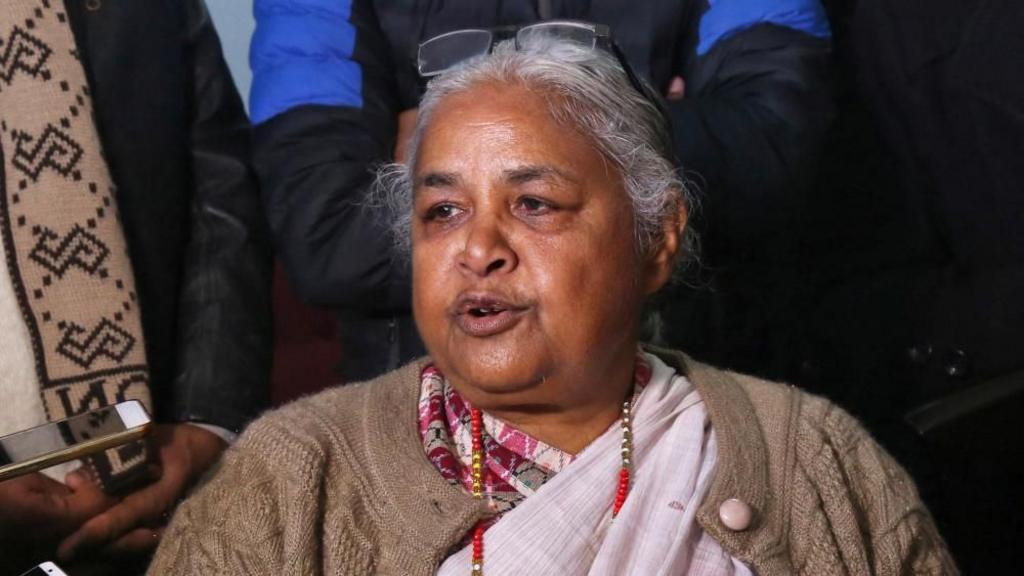Following a wave of anti-corruption protests that led to the government’s collapse, former Supreme Court Chief Justice of Nepal, Sushila Karki, has been appointed as the interim prime minister.
The 73-year-old Karki was inaugurated in a brief ceremony, marking her as the first woman to lead the Himalayan nation, a development reached after negotiations with protest leaders.
Recent mass demonstrations, triggered by a ban on social media platforms, resulted in over 50 fatalities in clashes with law enforcement.
Despite the ban’s reversal on Monday, the protests had already evolved into a widespread movement. On Tuesday, demonstrators in Kathmandu reportedly set fire to the parliament and other government buildings, leading to Prime Minister KP Sharma Oli’s resignation.
President Ram Chandra Poudel’s press advisor confirmed to the BBC earlier on Friday that Karki would be sworn into office in the evening.
The agreement between the president and protest leaders followed several days of consultation, with legal experts also providing input.
Parliament was dissolved late on Friday, and it was announced that general elections would be held on March 5 of the coming year.
Karki is expected to form her cabinet within the next few days.
Widely respected for her integrity, Karki has garnered support from student leaders representing “Gen Z” to head the interim government.
Her cabinet will face significant challenges, including restoring law and order, rebuilding damaged infrastructure, and addressing the concerns of Gen Z protesters seeking change, as well as others in Nepal who fear the potential destabilization of the nation’s young democracy and constitutional framework.
Another essential task will involve ensuring justice for those responsible for the violence.
Karki’s appointment is the result of compromises reached during negotiations this week, facilitated by Nepal’s army chief. Her Gen Z supporters have expressed enthusiasm on social media, viewing this as a step towards a new political direction for the country.
On Tuesday, Karki visited the protest site in Kathmandu where 19 individuals were killed in clashes with police the previous day. She also visited injured individuals receiving treatment in hospitals.
Born into a family with ties to the Koirala political dynasty from the Nepali Congress party, Nepal’s largest democratic party, Karki later married Durga Subedi, a leader within the party.
Karki has acknowledged her husband’s support as instrumental in her progression from a lawyer to Nepal’s chief justice in 2016.
However, her tenure as chief justice, lasting nearly 11 months, was not without controversy, including an impeachment attempt.
Nepal’s army maintains a presence in Kathmandu as the country deals with its worst unrest in decades. Restrictions were briefly eased to allow residents to acquire essential items.
The protests were initially sparked by the government’s decision last week to block 26 social media platforms, including WhatsApp, Instagram, and Facebook. However, they quickly expanded to encompass deeper dissatisfaction with Nepal’s political establishment.
Leading up to the ban, a “nepo kid” campaign, which highlighted the extravagant lifestyles of politicians’ children and allegations of corruption, gained traction on social media.
Although the social media ban was swiftly lifted on Monday night, the protests had already gained significant momentum.
Nepalis are returning home from India as the Himalayan nation deals with intense protests.
The BBC’s Samira Hussain reports on the heavy military presence in the Nepali capital.
Instability within Nepal raises concerns for India due to Nepal’s strategic geographic location.
The BBC’s Charlotte Scarr explains how specific slogans ignited a wave of demonstrations in Kathmandu.
Fierce protests against corruption and nepotism escalated into arson and violence on Tuesday.

